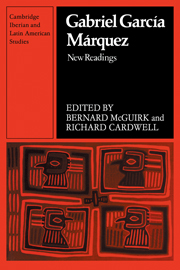Book contents
- Frontmatter
- Contents
- Note on the translations
- List of contributors
- Introduction
- 1 Characterization in the early fiction of Gabriel García Márquez
- 2 Beware of gift-bearing tales: reading ‘Baltazar's Prodigious Afternoon’ according to Marcel Mauss
- 3 The body as political instrument: communication in No One Writes to the Colonel
- 4 Magical realism and the theme of incest in One Hundred Years of Solitude
- 5 Translation and genealogy: One Hundred Years of Solitude
- 6 The humour of One Hundred Years of Solitude
- 7 On ‘magical’ and social realism in García Márquez
- 8 Aspects of narrative structure in The Incredible and Sad Story of the Innocent Eréndira and her Heartless Grandmother
- 9 Language and power in The Autumn of the Patriarch
- 10 Writing and ritual in Chronicle of a Death Foretold
- 11 Free-play of fore-play: the fiction of non-consummation: speculations on Chronicle of a Death Foretold
- 12 A prospective post-script : apropos of Love in the Times of Cholera
- The solitude of Latin America: Nobel address 1982
- Select bibliography
- Index
4 - Magical realism and the theme of incest in One Hundred Years of Solitude
Published online by Cambridge University Press: 05 November 2011
- Frontmatter
- Contents
- Note on the translations
- List of contributors
- Introduction
- 1 Characterization in the early fiction of Gabriel García Márquez
- 2 Beware of gift-bearing tales: reading ‘Baltazar's Prodigious Afternoon’ according to Marcel Mauss
- 3 The body as political instrument: communication in No One Writes to the Colonel
- 4 Magical realism and the theme of incest in One Hundred Years of Solitude
- 5 Translation and genealogy: One Hundred Years of Solitude
- 6 The humour of One Hundred Years of Solitude
- 7 On ‘magical’ and social realism in García Márquez
- 8 Aspects of narrative structure in The Incredible and Sad Story of the Innocent Eréndira and her Heartless Grandmother
- 9 Language and power in The Autumn of the Patriarch
- 10 Writing and ritual in Chronicle of a Death Foretold
- 11 Free-play of fore-play: the fiction of non-consummation: speculations on Chronicle of a Death Foretold
- 12 A prospective post-script : apropos of Love in the Times of Cholera
- The solitude of Latin America: Nobel address 1982
- Select bibliography
- Index
Summary
For all the attention it has received since its publication, One Hundred Years of Solitude remains an elusive and enigmatic novel. Although accepted as one of the major examples of Latin America's contribution to modernist writing, the problem of understanding how its highly acclaimed technique of magical realism actually works is still unresolved. At the level of simple definition there can be little disagreement: magical realism is a narrative style which consistently blurs the traditional realist distinction between fantasy and reality. Beyond this, critical opinion is divided as to whether magical realism is entirely self-referring or whether it establishes a new kind of relationship between fiction and reality.
According to the former view, One Hundred Years of Solitude is analogous to ficciones of Borges; its fictional world is autarchic, creating through the act of narration special conditions of development and meaning which enable the fictive imagination to achieve a free-floating state of pure self-reference akin to the exhilarated innocence of children at play. The difficulty with such a view is that it cannot explain the political and historical allusions in the novel. To be consistent, it must absorb these also into the realm of ludic autonomy, and it therefore leaves García Márquez open to the charge of having ‘aestheticized’ the history of Latin America.
- Type
- Chapter
- Information
- Gabriel García MárquezNew Readings, pp. 45 - 64Publisher: Cambridge University PressPrint publication year: 1987
- 29
- Cited by



